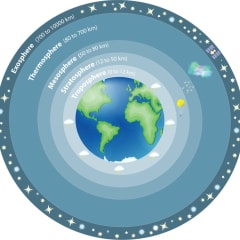Best Physics Careers
A bachelor's in physics doesn't just give you bragging rights at the dinner table; it can also open doors, professionally. Physics majors graduate with a strong arsenal of transferrable skills in areas such as data analysis, problem-solving, and numeracy. They're also able to communicate clearly about complex ideas, and possess a broad understanding of how the world functions—scientifically and otherwise. All of these qualifications are highly desirable, both in the field of physics and beyond.
Not only are physics graduates extremely hireable, they also earn more than other majors! A survey by the National Association of Colleges and Employers found that students graduating with a bachelor's in physics can make up to $64,000 as their starting salary, straight out of school—outranking graduates of biology, psychology, marketing, and even finance.
Whether you're a recent graduate or an experienced professional seeking a career change, there are lots of options to consider. Let's take a look at just a few places your physics degree can take you.
This article will be covering the following careers:
| Career | Avg Salary | Satisfaction | Your Match |
|---|---|---|---|
| Astronaut | ?? | 4.1/5 | |
| Atmospheric Scientist | $102k | 3.4/5 | |
| Astronomer | $144k | 4.0/5 | |
| Software Engineer | $139k | 3.2/5 | |
| Aerospace Engineer | $93k | 3.6/5 | |
| Mathematician | $85k | 3.6/5 | |
| IT Support Specialist | $55k | 2.8/5 | |
| Investment Banker | $88k | 2.6/5 | |
| Professor | $59k | 3.7/5 |
Are these careers suited to you? Our comprehensive career test measures your personality traits and interests and matches you to over 800 careers.
1. Astronaut
Not every STEM degree qualifies candidates for a career as an astronaut, but a bachelor's in physics does. To get the job, aspiring astronauts will typically also need to gain professional experience and pass a physical examination. But if they're successful, they'll have the opportunity to contribute to one of the most fascinating careers on earth (and beyond). An astronaut's duties can including operating the spacecraft, conducting experiments, managing crew activities, performing space walks, supporting robotic equipment, and more.

Astronaut
An astronaut is selected and employed by NASA (National Aeronautics and Space Administration) to participate in space exploration missions.
2. Atmospheric Scientist
Data analysis is one of the most useful skills physics majors learn over the course of their degree. As an atmospheric scientist (or climatologist), they can put their knack for numbers and figures to use. Atmospheric scientists study the earth's climate, atmosphere, and weather through a scientific and mathematical approach. They pour over climate data, analyze weather patterns, and compile reports that help better our understanding of the planet we call home.

Atmospheric Scientist
An atmospheric scientist studies the Earth's atmosphere and its various components, including the gases, aerosols, and other physical and chemical processes that occur within it.
3. Astronomer
Astronomers study the wonders of the night sky. They use space-borne and ground-based scientific instruments, such as telescopes and specialized computers, to collect, analyze, and interpret data about celestial phenomena. They apply their skills in research and observation to help resolve practical problems and deepen our knowledge of the stars, planets, and nebulae above. The job requires a proficiency in working with numerical data; a detail-oriented, analytical mind; and the ability collaborate with other scientists—all of which physics majors possess.

Astronomer
An astronomer studies celestial objects and phenomena in the universe.
4. Software Engineer
It may come as a surprise, but many software companies prefer to hire physics graduates over other majors. Why? At their core, physics majors are problem solvers. Over the course of their studies, they learn to make sense of extremely complex information, identify patterns, troubleshoot challenges, and use logic and reasoning to resolve issues of all kinds. All of these qualities are ideally suited to a successful career as a software engineer.

Software Engineer
A software engineer applies engineering principles to the design, development, testing, and maintenance of software systems.
5. Aerospace Engineer
It's becoming more difficult to find work in engineering with a physics degree, but for the right candidate, it can be a very rewarding option. Many of the basic principles of engineering originate in physics, and with enough self-study and practical experience, physics majors can gain the other skills and knowledge required. They can truly thrive as aerospace engineers, a career that will let them apply their advanced math and science abilities to create spacecrafts, satellites, aircrafts, missiles, and more.

Aerospace Engineer
An aerospace engineer specializes in the design, development, and maintenance of aircraft, spacecraft, satellites, and other related systems.
6. Mathematician
Applied mathematicians use mathematical modelling, computational methods, and other techniques and theories to solve practical challenges in areas such as engineering, the social sciences, business, and government. Physics majors—with their in-depth knowledge of mathematics and their problem-solving skills—are perfect for the role.

Mathematician
A mathematician specializes in the study and exploration of mathematics.
7. IT Support Specialist
Although many physics graduates do go on to work in the field, a growing number seek employment in other industries. Technical support is one of the most appropriate, as this line of work requires the same aptitude for problem solving that physics majors master during their degree. Technical support specialists help consumers and businesses resolve a wide range of technical, hardware, or software-related issues. Constantly changing, mentally stimulating, and highly-social, this can be an ideal career for an extraverted physics major.

IT Support Specialist
An IT support specialist provides technical assistance and support to end-users and organizations regarding computer systems, software applications, hardware devices, and network infrastructure.
8. Investment Banker
Because of their numerical skills, physics majors can thrive in the world of investment banking. In fact, the Institute of Physics estimates that about 20 percent of physics graduates find jobs in finance after graduation! As investment bankers, physics graduates will learn to apply their mathematical modelling abilities to a new arena. Rather than investigating how the universe began, they'll use them to make predictions about bonds, stocks, financial trends, and more.

Investment Banker
An investment banker works within the investment banking industry.
9. Professor
For physics majors who feel their best within the walls of the university, a career as a professor is a perfect fit. Physics professors dedicate their lives to better understanding the physical world, performing cutting edge research into areas such as cosmology, astrophysics, science education, or experimental particle physics. They also help others fall in love with the subject: supervising PhD students, teaching undergraduate courses, and providing expert commentary on physics-related issues in the media.

Professor
A professor holds a high-ranking position within an educational institution, typically at the college or university level.